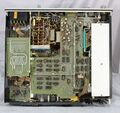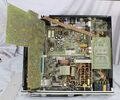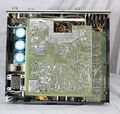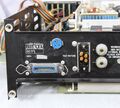1685: Difference between revisions
No edit summary |
No edit summary |
||
| Line 16: | Line 16: | ||
The {{Title|General Radio 1685 Digital Impedance Meter}} was available in {{Catalog 1978}} only. | The {{Title|General Radio 1685 Digital Impedance Meter}} was available in {{Catalog 1978}} only. | ||
The Type 1685 is a combination digital and analog impedance measuring device. The CRL values are displayed by a five digit LED display while D and Q use an analog system. Capacitance and inductance are measured at two selectable frequencies, 120 Hz and 1 kHz while resistance is measured using | The Type 1685 is a combination digital and analog impedance measuring device. The CRL values are displayed by a five-digit LED display, while D and Q use an analog system. | ||
Capacitance and inductance are measured at two selectable frequencies, 120 Hz and 1 kHz, while resistance is measured using DC voltages. The 1685 uses an eight-position range switch for capacitance and inductance measurements and a ninth position for high resistance measurements. | |||
Above the range switch are illuminated arrows pointing to the range of greatest resolution. The analog DQ dial uses similar illuminated arrows guiding the user towards the null. | |||
The 1685 has a comparator for Go/No Go testing of components. Limits are set with five decade switches for low and high values and indicator lamps for the results. Also provided is an indicator for high D or low Q if these values exceed the DQ dial setting. The four connections to the unknown are provided a special connector at the rear of the instrument, a test fixture or special cable are required. The Type [[1685-P1]] is the recommended test fixture. | The 1685 has a comparator for Go/No Go testing of components. Limits are set with five decade switches for low and high values and indicator lamps for the results. Also provided is an indicator for high D or low Q if these values exceed the DQ dial setting. The four connections to the unknown are provided a special connector at the rear of the instrument, a test fixture or special cable are required. The Type [[1685-P1]] is the recommended test fixture. | ||
Latest revision as of 07:07, 8 June 2024
The General Radio 1685 Digital Impedance Meter was available in Catalog 1978 only.
The Type 1685 is a combination digital and analog impedance measuring device. The CRL values are displayed by a five-digit LED display, while D and Q use an analog system.
Capacitance and inductance are measured at two selectable frequencies, 120 Hz and 1 kHz, while resistance is measured using DC voltages. The 1685 uses an eight-position range switch for capacitance and inductance measurements and a ninth position for high resistance measurements.
Above the range switch are illuminated arrows pointing to the range of greatest resolution. The analog DQ dial uses similar illuminated arrows guiding the user towards the null.
The 1685 has a comparator for Go/No Go testing of components. Limits are set with five decade switches for low and high values and indicator lamps for the results. Also provided is an indicator for high D or low Q if these values exceed the DQ dial setting. The four connections to the unknown are provided a special connector at the rear of the instrument, a test fixture or special cable are required. The Type 1685-P1 is the recommended test fixture.
Specifications
- Capacitance Range: 0.01 pF to 20,000 μF
- Inductance Range: 0.01 μH to 2000 H
- Resistance: 0.1 mΩ to 20 MΩ
- Dissipation Factor: 0 to 10
- Q Factor: .1 to infinity
- Basic Accuracy: 0.1% basic accuracy for dc and 1 kHz; 0.5% for 120 Hz measurements














